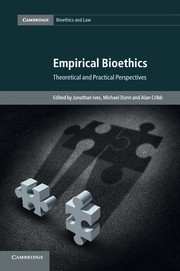Description
Empirical Bioethics
Theoretical and Practical Perspectives
Cambridge Bioethics and Law Series
Coordinators: Ives Jonathan, Dunn Michael, Cribb Alan
This volume brings together key researchers in empirical bioethics, presenting a range of theoretical and practical perspectives on methodology.
Language: English
Subject for Empirical Bioethics:
Empirical Bioethics
Publication date: 06-2018
Support: Print on demand
Publication date: 06-2018
Support: Print on demand
Empirical Bioethics
Publication date: 12-2016
Support: Print on demand
Publication date: 12-2016
Support: Print on demand
Description
/li>Contents
/li>Biography
/li>
Bioethics has long been accepted as an interdisciplinary field. The recent 'empirical turn' in bioethics is, however, creating challenges that move beyond those of simple interdisciplinary collaboration, as researchers grapple with the methodological, empirical and meta-ethical challenges of combining the normative and the empirical, as well as navigating the difficulties that can arise from attempts to transcend traditional disciplinary boundaries. Empirical Bioethics: Theoretical and Practical Perspectives brings together contributions from leading experts in the field which speak to these challenges, providing insight into how they can be understood and suggestions for how they might be overcome. Combining discussions of meta-ethical challenges, examples of different methodologies for integrating empirical and normative research, and reflection on the challenges of conducting and publishing such work, this book will both introduce the novice to the field and challenge the expert.
Part I. Theoretical Perspectives: 1. Theoretical perspectives: an introduction Jonathan Ives, Michael Dunn and Alan Cribb; 2. Empirical bioethics and the fact/value distinction John McMillan; 3. Metaethics, relativism and empirical bioethics Mark Sheehan; 4. Empirical bioethics and the role of the professional ethicist in policy making: politics, authority and expertise Kyle T. Edwards and Zuzana Deans; 5. Evidence, epistemology and empirical bioethics Ilina Singh; 6. Friends, foes, flatmates: on the relationship between law and (empirical) bioethics Richard Huxtable; 7. Embracing diversity in empirical bioethics Alan Cribb and John Owens; Part II. Practical Perspectives: 8. Practical perspectives: an introduction Michael Dunn, Jonathan Ives and Alan Cribb; 9. Moral improvement through interactive research: a practice example of dialogical empirical bioethics Elleke Landeweer, Bert Molewijk and Guy Widdershoven; 10. Reflective equilibrium as a normative empirical model: the case of Ashley X Ghislaine J. M. W. van Thiel and Johannes J. M. van Delden; 11. Theory and practice of democratic deliberation in bioethics research Scott Kim; 12. Feminist empirical bioethics Jackie Leach Scully; 13. Lessons from experience: establishing and running interdisciplinary mixed method bioethics research Bobbie Farsides and Clare Williams; 14. Publishing research in empirical bioethics: quality, disciplines and expertise Lucy Frith and Heather Draper.
Jonathan Ives is a Senior Lecturer in Biomedical Ethics and Law at the University of Bristol's Centre for Ethics in Medicine. He has published extensively on the theory and methodology of empirical bioethics, with his methodological work developing primarily through his research on the ethics of fathers, fatherhood and the family.
Michael Dunn is a Lecturer in Health and Social Care Ethics at the Ethox Centre, University of Oxford, where he is also Director of Undergraduate Medical Ethics and Law Education, and Director of the Centre's graduate training programmes. Dunn has published extensively on empirical bioethics methodology, and more broadly in clinical ethics and research ethics.
Alan Cribb is Co-Director of the Centre for Public Policy Research at King's College London. He has a particular interest in developing interdisciplinary scholarship that links philosophical, social science and professional concerns, and in addition to work on empirical bioethics, he has written about health and education policy, health services research and professional education.
Michael Dunn is a Lecturer in Health and Social Care Ethics at the Ethox Centre, University of Oxford, where he is also Director of Undergraduate Medical Ethics and Law Education, and Director of the Centre's graduate training programmes. Dunn has published extensively on empirical bioethics methodology, and more broadly in clinical ethics and research ethics.
Alan Cribb is Co-Director of the Centre for Public Policy Research at King's College London. He has a particular interest in developing interdisciplinary scholarship that links philosophical, social science and professional concerns, and in addition to work on empirical bioethics, he has written about health and education policy, health services research and professional education.
© 2024 LAVOISIER S.A.S.
These books may interest you

BioethicsMethods, Theories, Domains 172.36 €



